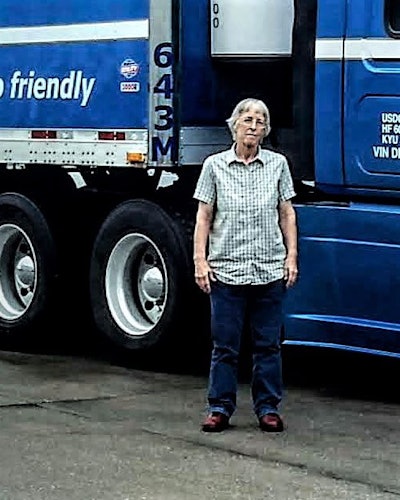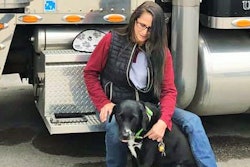
Age: 67
Occupation: Trucker (retired), author
Previous jobs: ESL teacher, librarian, cellist, lay missionary, technical typist
“The problem was that I didn’t have any money and nobody seemed eager to hire a 50-something woman. …”
Year 2004 was no easy one for Annette Wilcox. She had recently lost the hearing in her left ear, which, in effect, ended her career as a teacher and cellist. Just back from a one-year missionary stint in East Africa where she taught English in Tanzania, the one-time magna cum laude graduate was now nearly broke, with no job prospects, and nowhere of her own to stay.
So the former librarian chose a non-traditional career path, one she conceded early on was “physically a little too hard for me.” In the dead of winter, in a borrowed Toyota, she drove up to a trucking company in Pennsylvania. There, Wilcox began her rocky apprenticeship as an over-the-road trucker. An unlikely student, now in her 50’s, navigating a new subculture with its own language, Wilcox quickly found it would come to demand from her “a radical dependence on God.”
It would also compel her to write.
In those difficult first 12 months, she devoted herself to an autobiographical account, written all in longhand, that chronicled her sometimes harrowing transition into a business where one’s service is measured in miles. Hers would eventually come to 1.1 million. Not bad for a latecomer.
 “Bumping The Dock: A Story of God’s Grace and an 18-Wheeler” is available via the website of Enroute Books and Media in digital and print versions.
“Bumping The Dock: A Story of God’s Grace and an 18-Wheeler” is available via the website of Enroute Books and Media in digital and print versions.While her “Bumping the Dock” book began as a cathartic exercise, Wilcox, the daughter of a college professor, had the presence of mind to realize that one’s early impressions only remained fresh for so long. The first draft of the book was completed within that first year.

I had a chance to chat with the trucking librarian a few weeks ago:
“My father was a research mathematician. He put research above everything else, but he also had a wanderlust. We moved every year and a half or so on the average. Part of this was some ‘back-and forthing’ as he played two universities off against each other while climbing the ladder from assistant professor to full professor with tenure. A friend once told me she thought initially that I was rootless because I was a trucker but that later she came to realize that I was a trucker because I was rootless.
“Becoming a trucker jarred me emotionally in the way that leads me to want to write about an experience — write it out of my system? I don’t remember why, but I wanted the beginner’s perspective…. I write all first drafts by hand, either on yellow pads or into composition notebooks. This is partly because C.S. Lewis recommended it. He thought that the clicking of typewriter keys distracted one from hearing the rhythm of the sentences.”
What ensued was a gorgeously granular view of entry-level trucking from the highly literate voice of a woman in the throes of one of her lowest points of life. It’s also an unvarnished analysis, from a teacher’s perspective, of the way she was being taught. Some of Wilcox’s earliest accounts of her trucking years, too, are evocative portrayals of the heroes and villains she encounters along the way.
One of the heroes from her first year was a trainer named Johnny Wattenburg, the Hooters-patronizing NASCAR fanatic so very much unlike the author. They have absolutely nothing in common, yet Wilcox emerges from the relationship with a profound respect for him as a teacher and driver/trainer. They would become lifelong friends.
Of the low company her new career would require her to keep, Wilcox describes a truck driving schoolmate thusly:
The seventh student was a large, affable young man, upon whom the responsibilities of life seemed to weigh rather lightly, and who carried several felonies on his record, something he seemed to regard as more of a personal misfortune than as an occasion for shame. He had recently married for the second time and thus had eight children, four of them his own and four of them belonging to his new wife.
Seeing the world of truck stops and rude shippers for the first time through the sage observations of this unlikely novitiate is like having a boon companion riding shotgun on your weekly run. When Wilcox saw an IdleAir port for the very first time, with its tractor-trailers all nosed in diagonally, it reminded her of “nursing puppies.”
When a rude receiver crosses her, Wilcox cops to committing her very first act of vandalism: correcting the misspellings on a posted memo on the grocery warehouse wall.
“Bumping The Dock” went through several iterations throughout the next 12 years. Like many a driver’s project, it would ferment for a while before finally coming to fruition.
Now in retirement, Ms. Wilcox’s main purpose in life is to be “one of those little old ladies who pray the Rosary every morning before Mass.”
Not bad for a latecomer at all.
Read all installments in the “Faces of the Road” series of oral histories/profiles.










